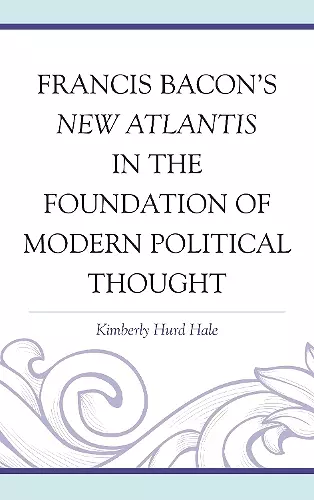Francis Bacon's New Atlantis in the Foundation of Modern Political Thought
Format:Hardback
Publisher:Bloomsbury Publishing PLC
Published:10th Oct '13
Should be back in stock very soon

Francis Bacon, long considered a minor figure in the founding of modern political thought, is now recognized as one of its foremost thinkers. Bacon not only championed a new type and method of scientific inquiry, he also developed a plan for how modern society could be re-ordered to accommodate and promote scientific progress. Bacon’s scientific writings cannot be wholly understood apart from his political writings, and many of his works combine the two topics so subtly that it is difficult to even place them in a definitive category; in this book, Kimberly Hurd Hale identifies the thread in Bacon’s body of work that links modern science and liberalism. Hale provides a detailed analysis of New Atlantis, examining Bacon’s place in the founding of modern political philosophy and the ways he relates to Plato, Machiavelli, and Hobbes. Hurd argues that Bacon’s demonstration of scientific rule in the New Atlantis is not meant as a blueprint for modern society; rather it shows us the dangers of a scientific society devoid of liberty. By examining what is troubling about the New Atlantis, this book explains what problems lead to the emergence of Atlantean societies, i.e. societies that are prosperous, ambitious, and doomed. It shows that Bacon’s portrait of Bensalem may provide the light necessary to guide those of us living in a world shaped by modern science through the dangerous seas.
Francis Bacon’s New Atlantis in the Foundation of Modern Political Thought is an innovative, creative, and controversial analysis of the text. It challenges many of the dominant, long-standing interpretations of the text and, as a result, provides substantial grounds for further study and analysis. * The Review of Politics *
Sir Francis Bacon’s New Atlantis is a puzzling, enigmatic work. Many scholars suppose it an enticement—a utopian vision of the paradise that modern science will usher in. Kimberly Hurd Hale begs to differ. She sees in it a word of warning to readers of discernment, and, in this closely argued book, she makes a powerful case that, in The New Atlantis, Bacon intimates that, if the proper steps are not taken, modern science may become the means by which a new species of tyranny is established. -- Paul Rahe, Hillsdale College
This provocative book contends that Bacon, founder of scientific utopianism, was also a doubter. He doubted the dogmatic extension of scientific method, cautioned against the dictatorial politics that his New Atlantis exhibits, and commended as correctives tradition, ancient political wisdom, and moderate liberalism. A stimulating interpretation of Bacon's crucial political-scientific work, which also confronts the burgeoning literature on Bacon and compares his politics with that of Hobbes and Condorcet. -- Robert Faulkner, Boston College
Hurd Hale’s is an important new book, providing both a rich intellectual history and an important corrective to the tradition of philosophical scholarship that assumes too great a distance between Bacon’s scientific and political thought. Indeed, her contention—that Bacon’s optimism regarding the modern fusion of science and liberal politics was tempered by a deep-seated skepticism regarding the sustainability of such a fusion—is likely to provoke the imagination of scholars for quite some time. A timely meditation on a timely subject. -- Jeremy J. Mhire, Louisiana Tech University
Stepping back from conventional assumptions about Bacon’s stature as a scientist, Kimberly Hurd Hale returns to his enigmatic, suggestively incomplete vision of a polity governed by the new sciences. With patience and interpretive persistence, she discovers in Bacon’s hopeful, strangely practical utopian project a deeper, nuanced meditation upon the limitations of scientific political organization, as well as Bacon’s debt to the ancients’ understanding of the city’s sustaining and mortal imperfections. -- John C. Briggs, University of California, Riverside
ISBN: 9780739181508
Dimensions: 236mm x 160mm x 19mm
Weight: 386g
162 pages